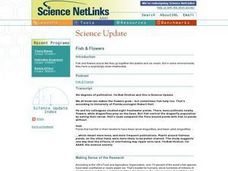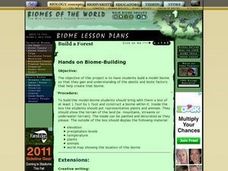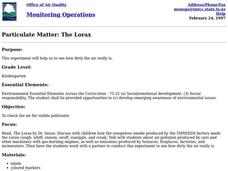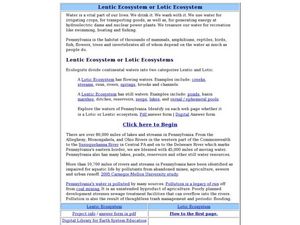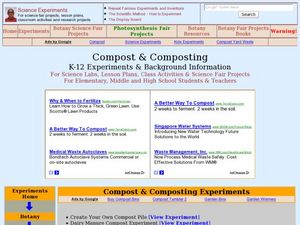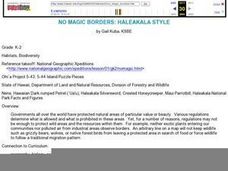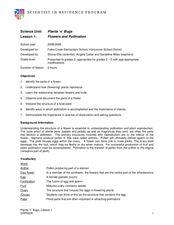Curated OER
Ecosystem Tumble
Learners create visual representations of ecosystems. In this ecology lesson, students discuss the interdependence of plants and animals in various ecosystems. Learners cut pictures from magazines and glue them on sturdy blocks. Using...
Curated OER
What Are the Layers of the Rain Forest?
Students investigate the different levels of the rain forest by comparing it to an apartment. In this ecology lesson plan, students practice using forest related vocabulary words and complete a vocabulary data sheet. Students...
Curated OER
Wild, Wild Wetland Wildlife
Students investigate biology by participating in a science experiment. In this dissection lesson, students conduct a nature field trip around their school grounds and identify animals, plants, tracks and waste. Students dissect an owl...
Curated OER
Endangered Species
Students define extinction, name four animals and two plant species that are extinct, list three reasons why animals and plants become extinct, and create ways that would help prevent extinction.
Michigan Sea Grant
Wetlands
Wetlands may not sound particularly ornate, but they are as important as any habitat! With a hands-on activity, young scientists build a wetland model and observe its many functions in action. They discover the importance of wetlands to...
Curated OER
Food Web Mobile
Students explain the main concepts of food webs and food chains. They
describe the role of animals, plants, and other organisms in cycling energy and matter through a food web by creating mobiles. Lesson contains adaptations for all levels.
Curated OER
Wild Arctic
Students explore key terms, including food web and food chain. They discuss Arctic plants and animals, devise at least three Arctic food chains and create a food web showing connections among Arctic life.
Curated OER
The Effects of Pesticides on the Food Chain
Fourth graders generalize that all animals, including people, depend on plants as a food source. In this science lesson plan, 4th graders describe and construct a food chain, tell how pesticides enter the food chain, and discuss possible...
Curated OER
Amazing Grazing: Keeping Our Ecosystem Running
Students discover the value of sustainability within our ecosystem. In this ecological lesson, students discuss the importance of a food cycle in our society, and how humans can improve the conservation of a healthy ecosystem. Eventually...
Curated OER
Fish and Flowers
High schoolers read and discuss a research article that explains the unlikely link between increased fish populations and increased plant pollination. They answer reading guide questions to discover this ecological relationship.
Curated OER
Hands on Biome-Building: Build a Forest
Learners explore Earth science by identifying environmental factors. For this biome lesson, students discuss the importance of a functioning ecology and design a biome diorama. Learners utilize images of trees and plants which represent...
Curated OER
Man's Struggle for Environmental Preservation
Students examine the way all living things are connected to one another. In groups, they participate in experiments in which they analyze the chemical processes through the biosphere and explain the role of energy. They also brainstorm...
Curated OER
Soil Testing and Texturing
Young scholars are introduced to soil textures and why they are important in examining soil quality. They find out how to feel the difference between soil textures. Pupils describe which soil texture is best for gardens and growing...
Curated OER
Particulate Matter: The Lorax
Students explore air pollution. In this ecology lesson, students participate in an experiment in which 5 numbered jar lids are placed outside. Students bring one lid a day in until all jars are inside. Dirt specks are counted, observed,...
Curated OER
Zoo Poo
Students use Internet research to determine the amount of carbon dioxide produced per unit energy for biomass and coal. In this alternative energy lesson, students research to find out how much energy and carbon dioxide several coal and...
Curated OER
Lentic Ecosystem or Lotic Ecosystem
Students explore the differences between lentic and lotic ecosystems. In this ecology lesson students study the water systems in Pennsylvania.
Curated OER
Hands on Biome-Building
Students explore Earth science by participating in an environment activity. For this biome lesson, students discuss the importance of a healthy ecology in order to sustain life, both animal and plant. Students utilize a cardboard or wood...
Curated OER
Compost and Composting Experiments
Students investigate the composting process through a variety of experiments. In this ecology lesson, students discuss the benefits of composting. They examine how compost affect plant growth.
Curated OER
No Magic Borders: Haleakala Style
Students discuss borders and boundaries. They discuss pollution and the fact that boundaries cannot stop pollution and that pollution affects even protected wildlife and plants. They participate in an activity in which they must place...
Curated OER
Constitution/Deer Valley
Students mount plant samples of the school community. They take samples, mount and identify. Students place cardstock on a piece of cardboard. They glue label in a corner. Students position dried plants on cardstock the way they were...
Curated OER
LIfe Underground
Students investigate the ecological relationship of worms and plants. They discuss the experiment of observing worms in a jar with plants. Then record the data every few days. The students write an imaginary story about their...
Curated OER
Aquatic Investigations
Fifth graders investigate pond organisms, plant life, water temperatures, and changes that occur during the four seasons. They design scavenger hunts with the information collected about pond life. They read about the geology of the...
Curated OER
Flowers and Pollination
Students explore the environment by researching plant reproduction. In this pollination lesson, students define botany related vocabulary terms such as disc flower, petal and fertilization. Students dissect a flower with their classmates...
Curated OER
Activity 1: Please Pass the Energy, Food Webs in the Upper Ocean and Hydrothermal Vent Communities
Students create food webs for two different ocean communities. They are given cards showing organisms from the surface of the ocean. They arrange them in order of who eats whom. After this class activity, students create a food web for...









